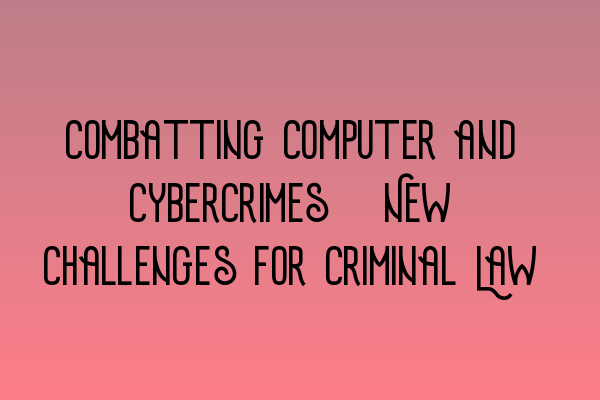Combatting Computer and Cybercrimes: New Challenges for Criminal Law
As technology continues to advance at an unprecedented pace, the criminal justice system faces new challenges in combatting computer and cybercrimes. These crimes, which involve the illegal use of computer systems and the internet, have grown exponentially in recent years, necessitating the evolution of criminal laws and practices to keep up with the changing landscape.
Computer and cybercrimes encompass a wide range of illegal activities, including hacking, identity theft, fraud, and the dissemination of malicious software. These crimes not only pose a significant threat to individuals and businesses but also have far-reaching implications for national security.
The Need for Updated Legislation
In order to effectively combat computer and cybercrimes, it is crucial that legislation is updated to address the evolving nature of these offenses. This involves enacting new laws that specifically target cybercriminals and provide appropriate penalties for their actions.
Furthermore, it is essential that law enforcement agencies and legal professionals receive adequate training and resources to effectively investigate and prosecute these crimes. The complexity of computer and cybercrimes often requires specialized knowledge and expertise, making it essential for criminal lawyers to stay updated on the latest developments in this field.
The Role of Digital Forensics
Digital forensics is a vital component in combatting computer and cybercrimes. It involves the collection, preservation, and analysis of digital evidence that can be used in criminal investigations and legal proceedings.
With the help of digital forensics, investigators can identify the individuals responsible for cybercrimes and gather the necessary evidence to secure convictions. Forensic experts use advanced techniques and tools to recover deleted data, trace IP addresses, and retrieve encrypted information.
As the reliance on digital devices and online platforms continues to grow, the importance of digital forensics cannot be overstated. Criminal lawyers must be well-versed in the principles of digital forensics to effectively defend their clients and challenge the prosecution’s evidence.
Global Cooperation and Information Sharing
Computer and cybercrimes know no boundaries, and perpetrators can operate from anywhere in the world. To combat these crimes effectively, international cooperation and information sharing are imperative.
Law enforcement agencies and legal professionals must collaborate on a global scale to identify, apprehend, and prosecute cybercriminals. This involves sharing intelligence, exchanging best practices, and establishing effective communication channels.
Educating the Public
In addition to legislative updates and law enforcement efforts, educating the public about computer and cybercrimes is vital in preventing these offenses. Many individuals fall victim to cybercriminals due to a lack of awareness and understanding of the risks involved.
By providing information and resources on how to protect personal and financial information, recognize phishing attempts, and secure devices and networks, we can empower individuals to take proactive measures to safeguard themselves against cybercrimes.
Moving Forward
Combatting computer and cybercrimes requires a comprehensive and multi-faceted approach. It is essential that legislation is updated, law enforcement is appropriately trained, digital forensics is utilized effectively, global cooperation is strengthened, and the public is educated on the risks and preventive measures.
At SQE Criminal Law & Practice Law UK, we are committed to staying at the forefront of these developments. Our comprehensive SQE 1 and SQE 2 preparation courses equip aspiring criminal lawyers with the knowledge and skills necessary to tackle the complex challenges of the digital age.
For further practice and to test your knowledge, we recommend reviewing our SQE 1 Practice Exam Questions and SQE 1 Practice Mocks FLK1 FLK2 resources. Additionally, for information on upcoming SRA SQE exam dates, please visit our page on SQE 1 Preparation Courses and SQE 2 Preparation Courses.
Together, we can combat computer and cybercrimes, safeguard our communities, and uphold the principles of justice in the digital age.
